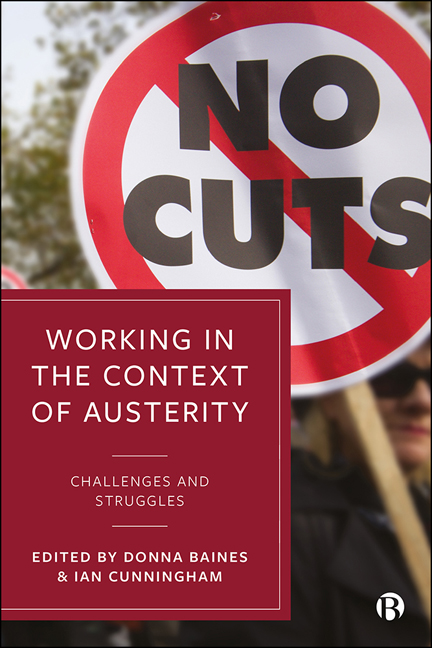16 - Afterword: Final Word and the Path Forward – Is the Myth of Austerity Giving Way to the Myth of the Robots Taking the Jobs?
Published online by Cambridge University Press: 18 March 2021
Summary
The premise on which austerity is founded is that markets should take over responsibilities from the state (Grimshaw and Rubery, 2012; Farnsworth and Irving, 2018) and therefore more responsibility should be placed on people to self-provision through wage employment or through unpaid labour. This is argued to be good for the economy, as in a globalized world employers would resist paying higher taxes. Under a low-tax regime and with access to an enlarged and flexible labour supply, existing employers would expand employment and new entrepreneurs would spring up to offer opportunities to work for all, provided no one was too choosy about what the work was or when, where or for how long they had to do it.
In the period since 2010, when austerity mania took over government policies fuelled by media calls to balance the books, a great deal has happened and a new mythology is emerging to replace the austerity mythology of perfectly functioning markets offering an alternative to state welfare systems. Instead of promising as much employment as we want, provided we are not fussy about conditions or security, the new mythology is the need to adjust to the demands of the unstoppable force of technology, which may result in mass destruction of jobs, and even the end of work as we know it (Frey and Osborne, 2017). The implications of how this forecast of a work Armageddon fits with the austerity agenda and the role of the state have not yet been fully thought through by politicians and those setting the international policy agenda. If, instead of offering self-provisioning through work as the means of survival, the predictions of mass job destruction are taken seriously, then there is no credibility to the argument that there is no need for state intervention in the labour market and social system. No one is seriously suggesting a smooth transition to, for example, full employment around a shorter working week under the impact of the artificial intelligence and digitalization revolution. To enable people to provide for themselves, some degree of state intervention will be needed to ensure a redistribution of work and resources, otherwise governments can expect to face the political discontent that would come from mass unemployment supported by benefits that have been cut to the bone under austerity.
- Type
- Chapter
- Information
- Working in the Context of AusterityChallenges and Struggles, pp. 321 - 334Publisher: Bristol University PressPrint publication year: 2020

